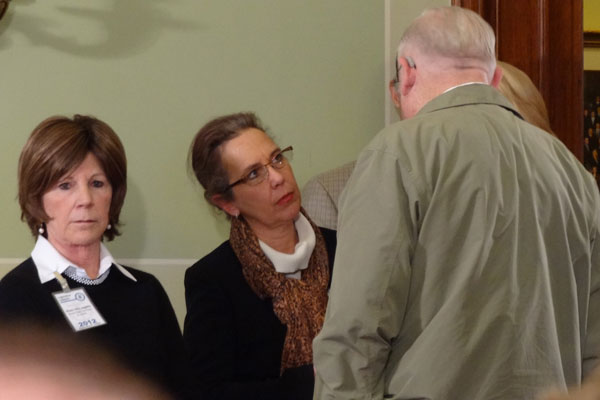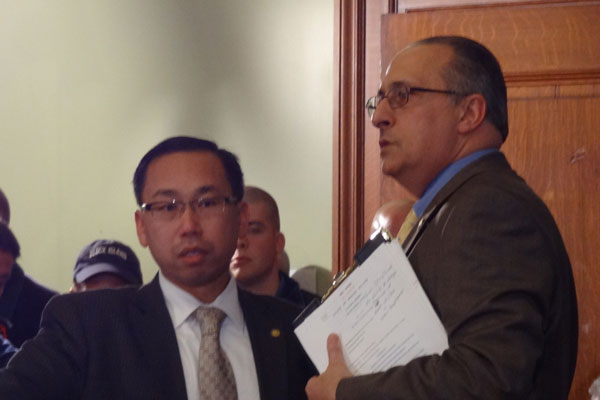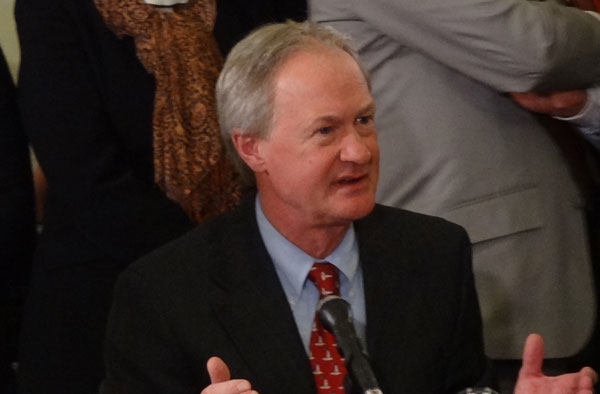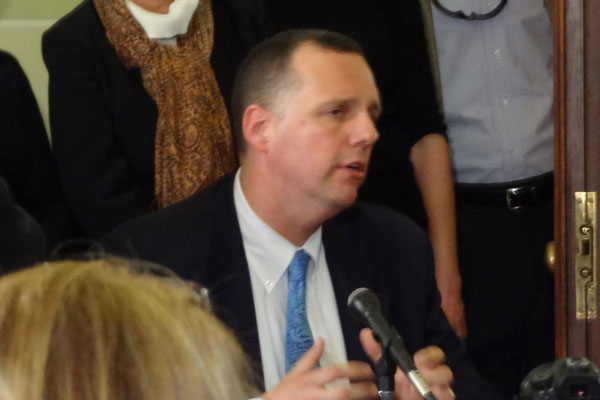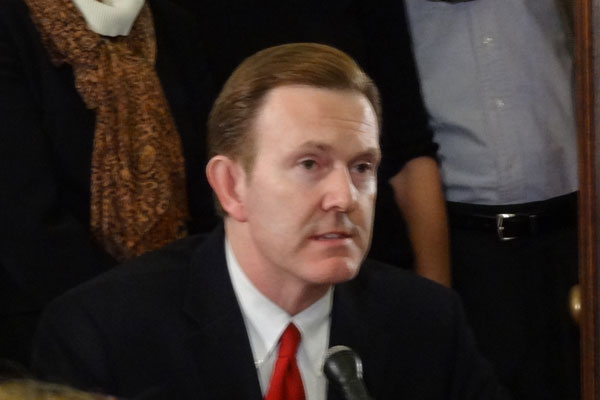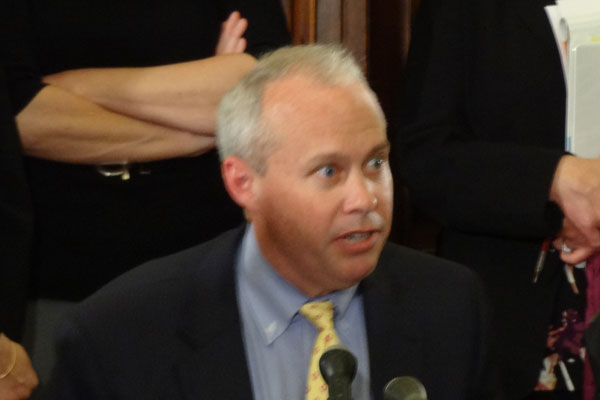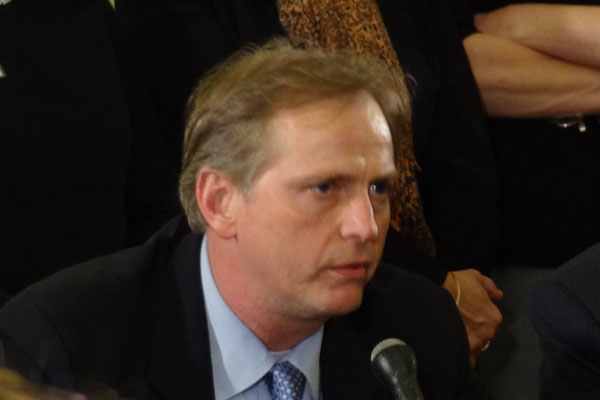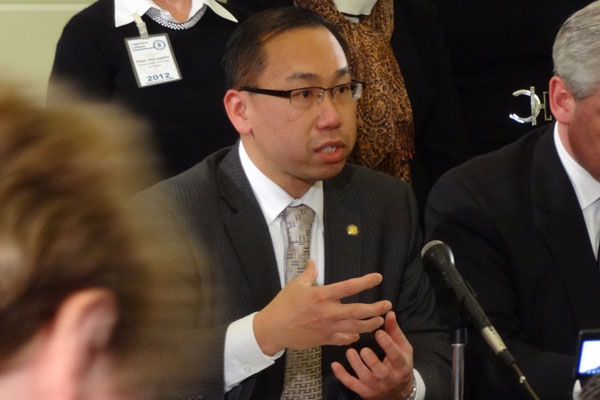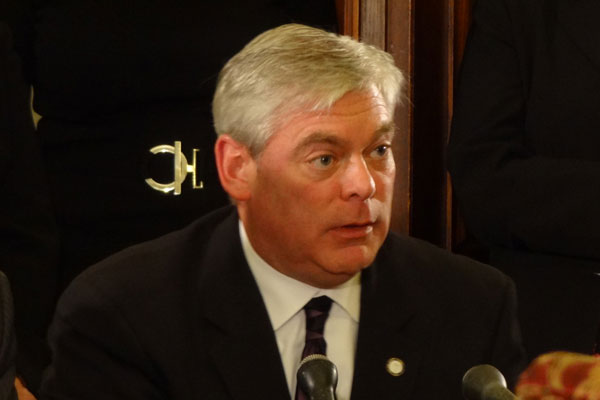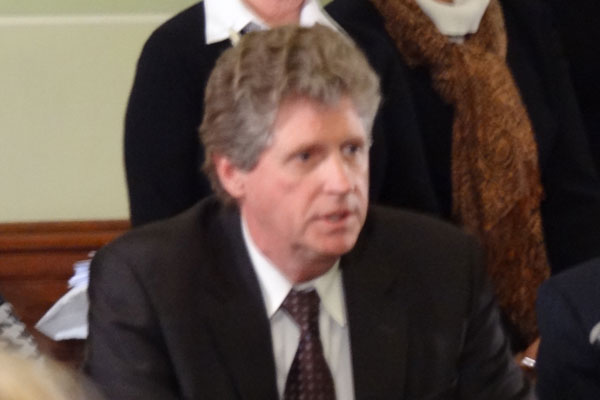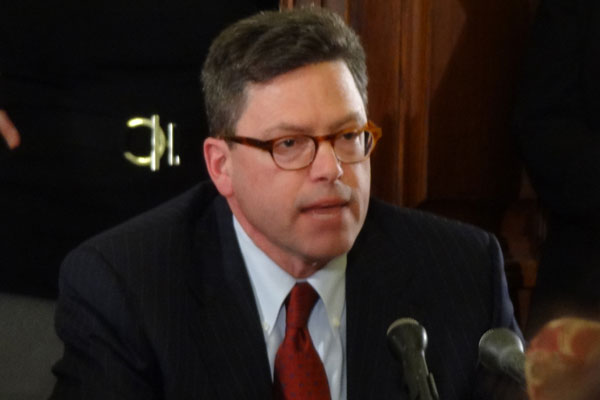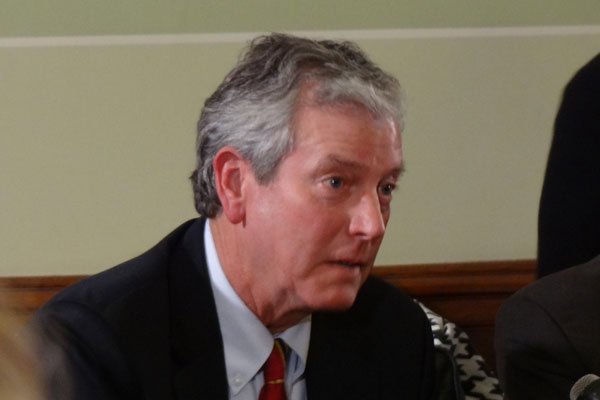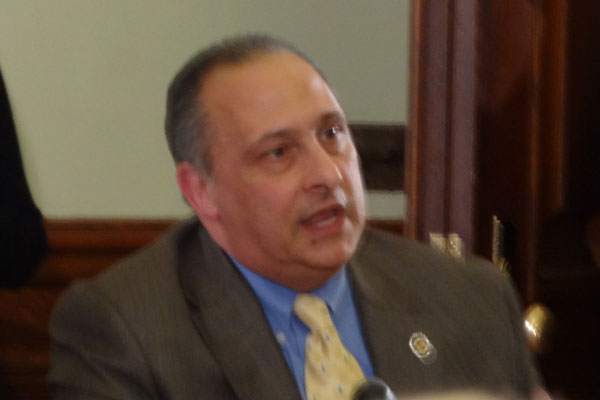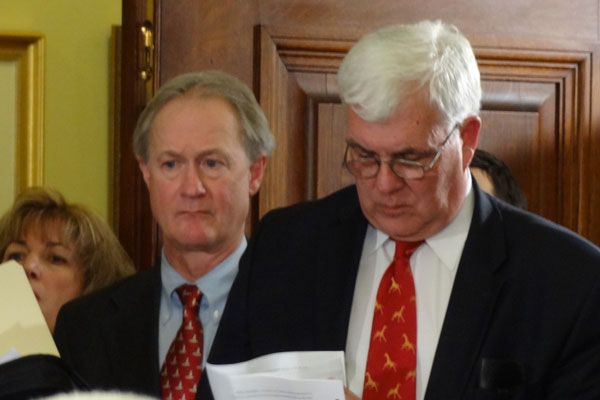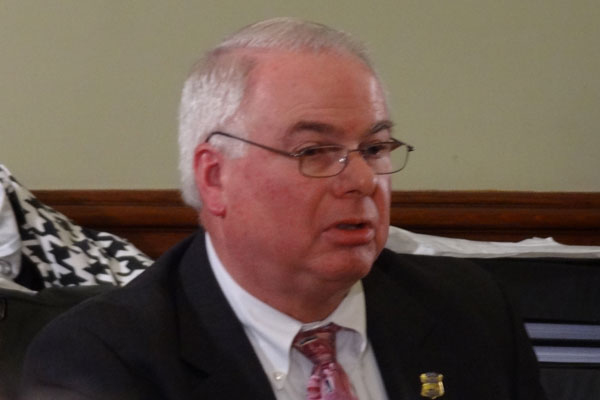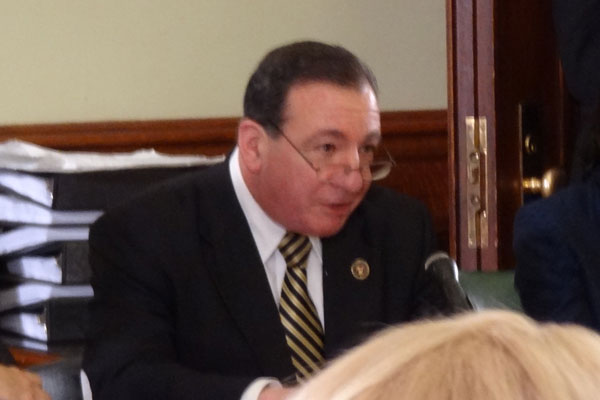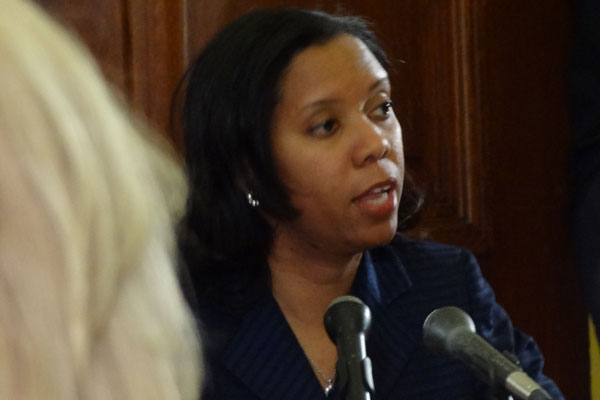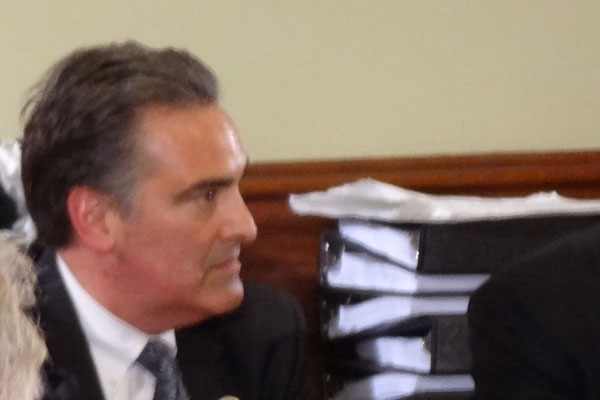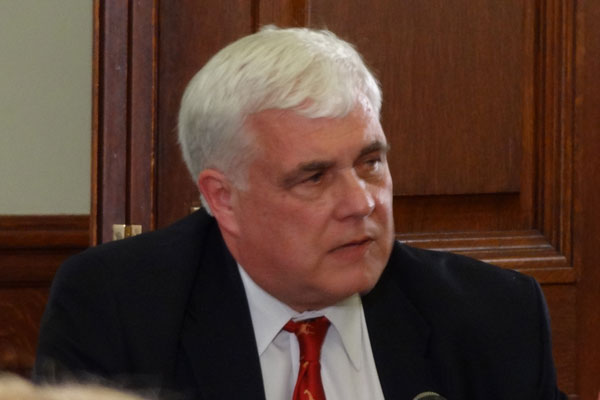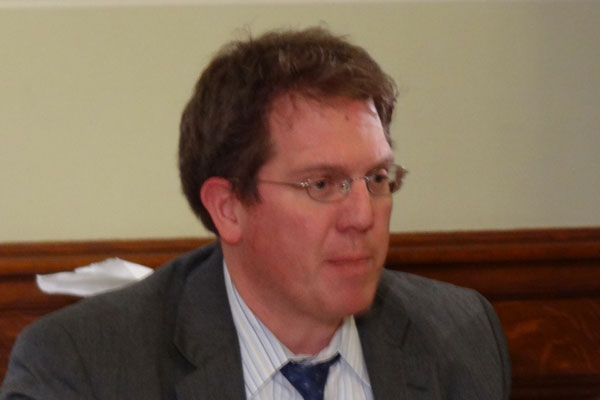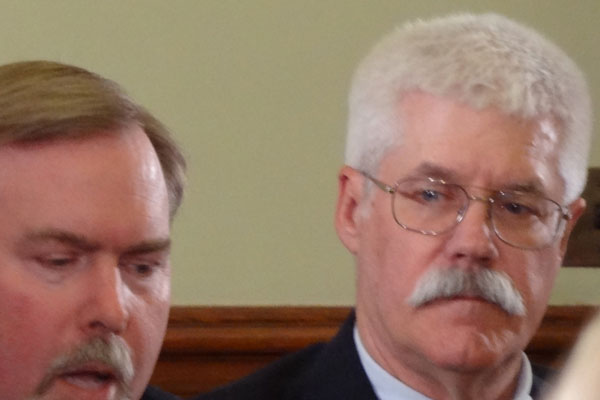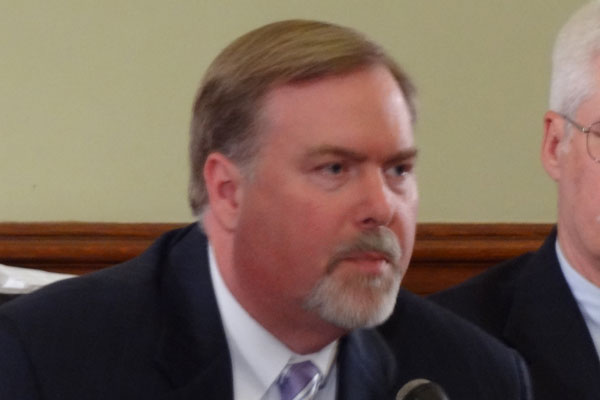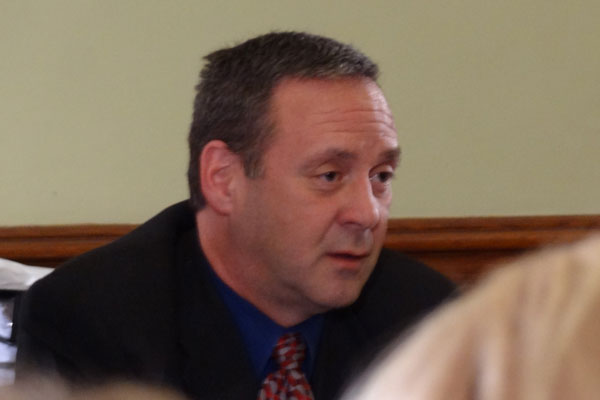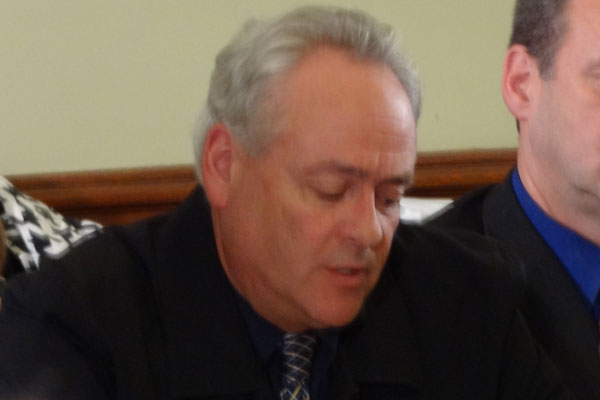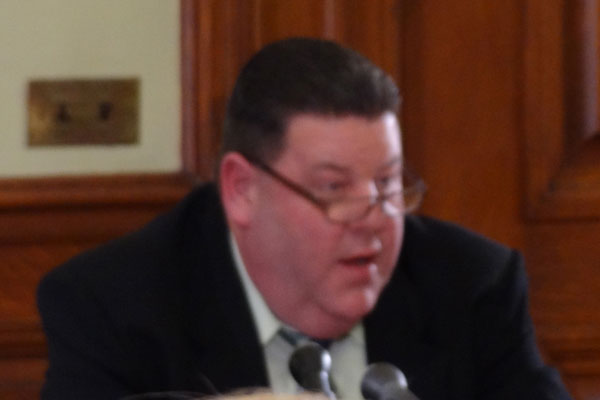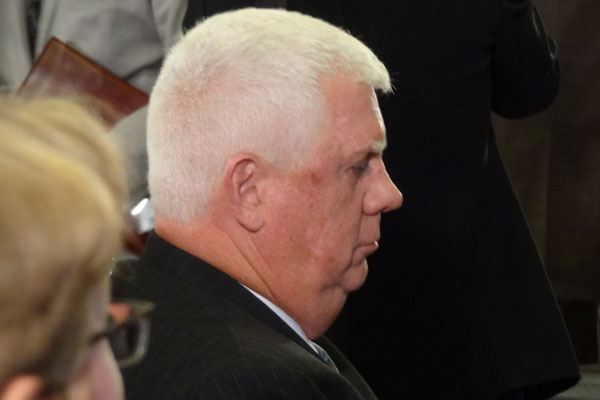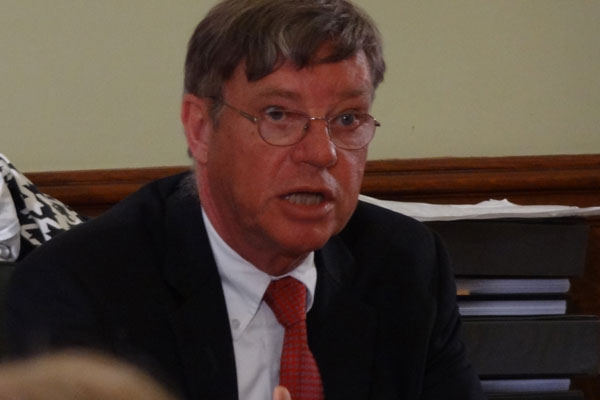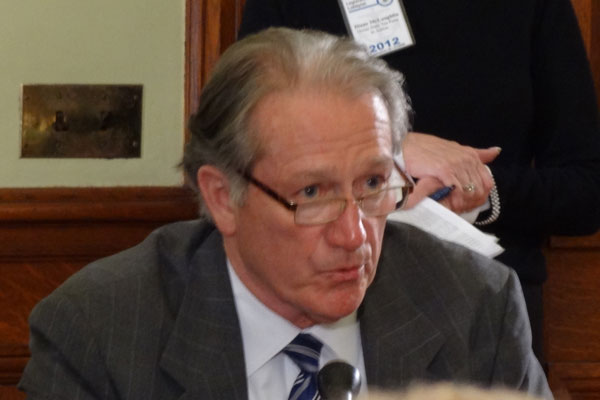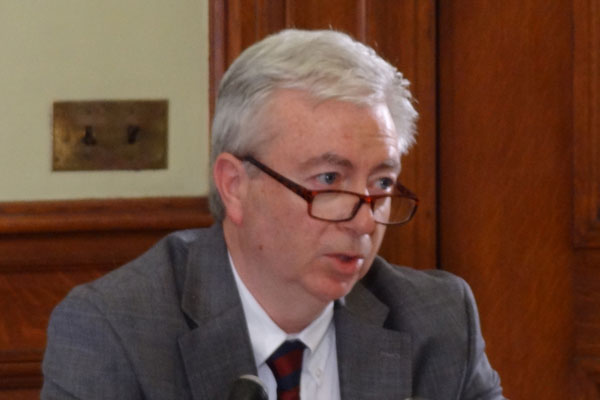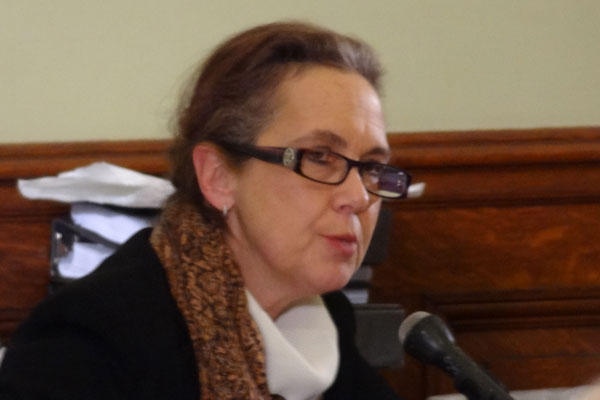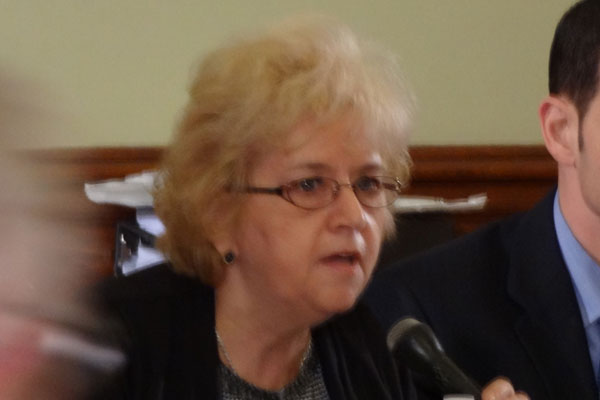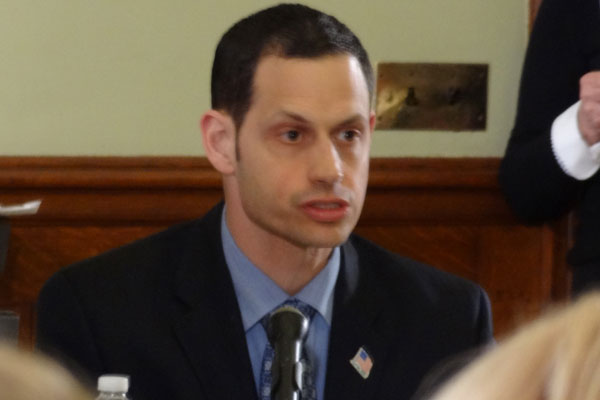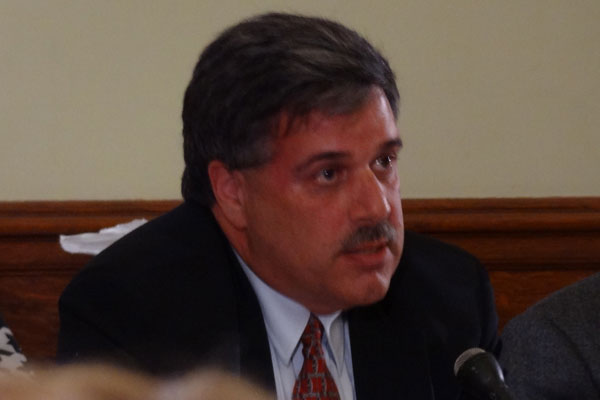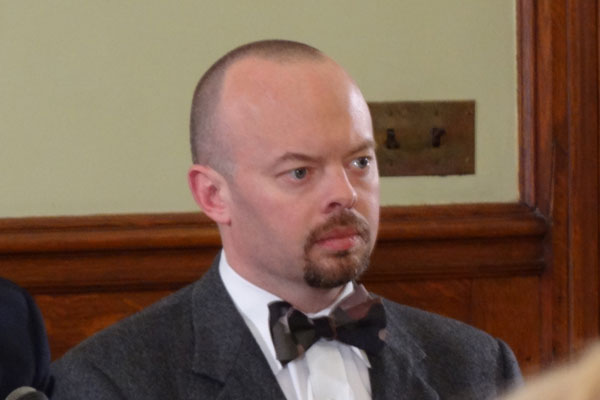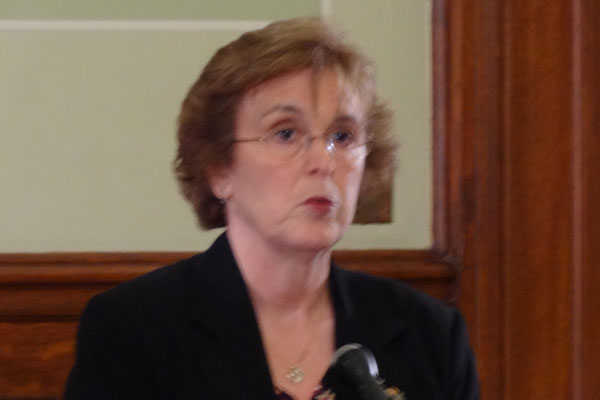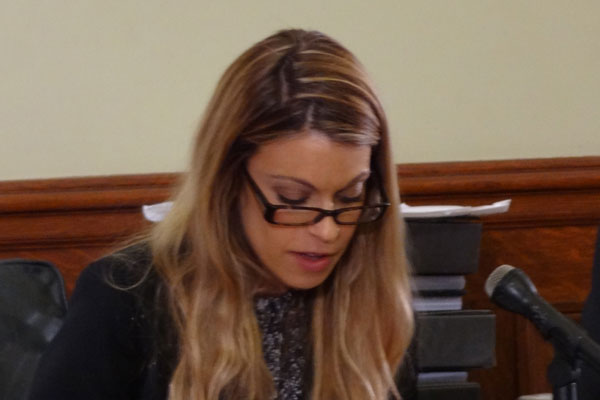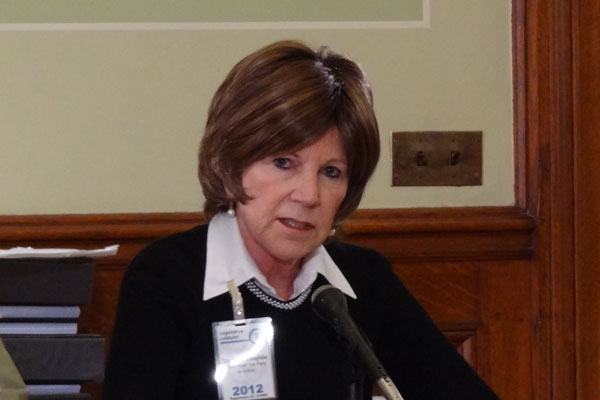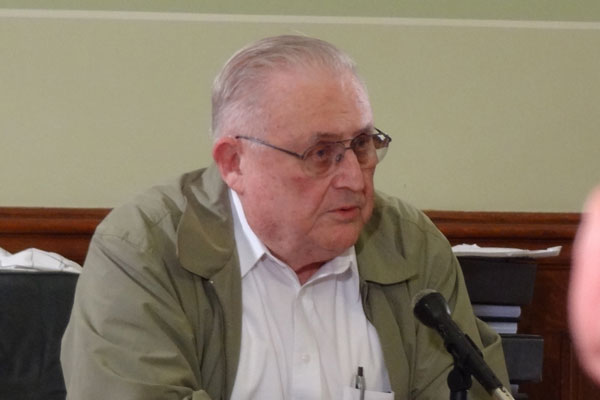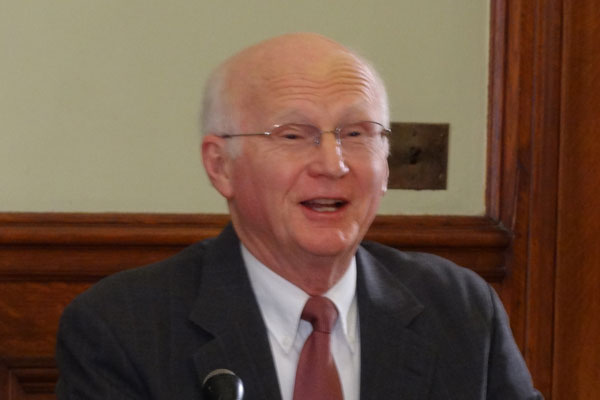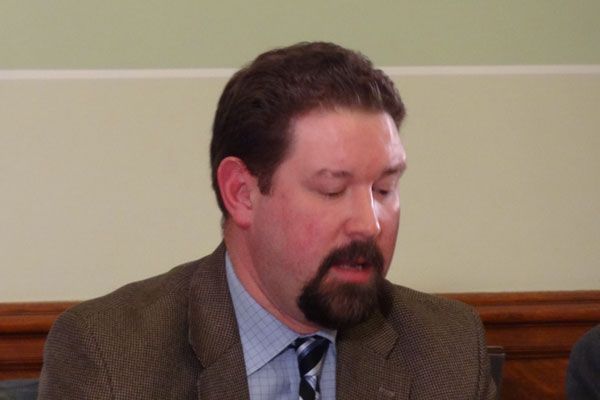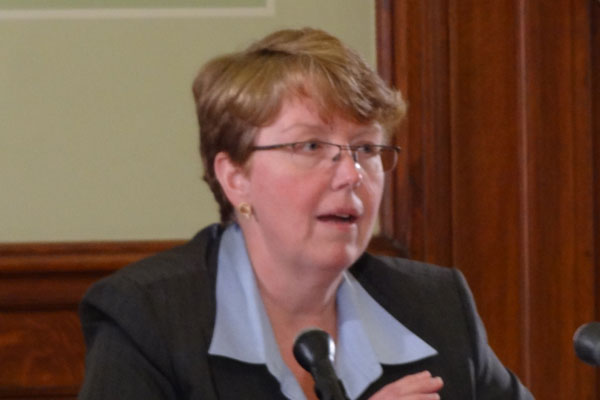04/12/12 – RI Senate Finance Committee Hearing
4:20 p.m.
Today, Governor Chafee’s municipal relief package gets its first airing in the General Assembly, in the Senate Finance Committee hearing. When I arrived shortly before 4:00, the hallway between the Senate Lounge and the Senate chambers was filled with firefighters, and more spilled out into the main hall to the north.
They appear to be mostly from Providence and Cranston, but I’m sure there are others, given the legislation.
The lounge is standing-room-only, and the only person who is not a firefighter, administration, union rep, or media that I can identify is Diane McLaughlin of the Ocean State Tea Party in Action (OSTPA).
4:35 p.m.
Looking through the governor’s legislation, earlier today, I found it reasonable for the most part. Of course, I’ve already expressed concerns about the school budget one (2823).
Of them all, the most problematic is 2826, which is the “Highly Distressed Community Intervention Act.” The problem with that one is not so much the approach to mandate and contract relief that it takes, but that the governor so dramatically attempted to limit its scope to the most struggling cities and towns.
Straight-up mandate relief would be preferable, allowing municipalities to avoid becoming distressed in the first place. As it is, they’ll have incentive to implement every single reform (on an oddly temporary basis) rather than eliminate some of the easier calls (like mandatory bus monitors) well in advance of financial trouble.
4:43 p.m.
Lisa Blais has joined Diane McLaughlin in the OSTPA contingent, by the way, but otherwise, I don’t think the tilt of the room has changed much. In walks Patrick Crowley, of the National Education Association.
4:45 p.m.
I was just thinking how much Crowley’s presence stands as evidence of the unity of the union front when I noticed a group of firefighters snickering about his characteristic bow tie.
4:56 p.m.
Still waiting. I have to say that I find the Senate area much preferable, with the green decor, than the dark, imposing red of the House. Considering that representatives are typically understood to be a step closer to (and more directly representative of) the electorate, it seems as if the color schemes ought to be reversed.
Of course, that impression comes from the perspective of a regular ol’ civilian. I’m sure those who favor a strong, independent hand for government officials (like our governor) think the arrangement to be entirely appropriate as is.
5:04 p.m.
I’m thinking I should have brought water. It’s a big room, but there are a lot of people in it, and the Capitol TV light right behind me is throwing off a lot of heat. In that respect, I’m paying the price for transparency.
5:11 p.m.
Harry Staley has brought RISC to join OSTPA. Interesting legislation; a variety of groups could go either way.
The governor’s team has also arrived, including Susanne Greschner from Municipal Finance and Rosemary Booth Gallogly, Director of the Dept. of Revenue.
5:16 p.m.
Cranston Mayor Allan Fung can’t find a seat.
5:21 p.m.
Committee members are beginning to arrive. Through the door, it looks like the hallway is still full.
5:23 p.m.
And then the committee members begin to leave. I’m thinking that one of the advantages of liveblogging via Twitter must be the opportunity for back and forth with others, which would be not unlike sportscasters’ banter while there’s a delay of the game.
I see the governor out there in the crowd. You’d think they’d let him in…
5:28 p.m.
By way of warning, I suspect I’ll miss (or misspell) a bunch of names. Please don’t be shy about emailing or commenting corrections.
5:33 p.m.
Now we’re underway. The committee is entering. The governor is here. The room is probably well over capacity (as the firefighters near me were discussing a moment ago).
5:35 p.m.
Chairman Daniel DaPonte has opened the meeting, noting the poor acoustics of the room.
Chafee thanks the bill’s sponsors. “I spent 11 years at the local level” (4 as councilman and 7 as the mayor).
“The truth of the matter is that RI is about in that national average with our sales tax and our income tax.” It’s the property tax that “is among the nation’s highest, so that’s where our focus should be.” That’s one of his reasons for this municipal package.
5:38 p.m.
Avoiding any more bankruptcies is a critical priority.
He’s describing different methods of addressing the “crash and fall” of the economy. MA raised taxes; RI cut state aid. “It disproportionately affected the towns that could least afford it.” Rich towns didn’t get much aid to begin with.
5:39 p.m.
He’s going over a chart showing the state aid loss from 2008 to 2011 for Providence, Pawtucket, Woonsocket, and West Warwick, totaling $54.9 million, $19.8 million, $2.7 million, and $1.7 million, respectively.
5:41 p.m.
At the same time, he says, the state didn’t let the municipalities reduce their obligations.
“Any accusations of mismanagement (among the towns), I vociferously disagree with that.”
The loss of state aid was almost matched dollar for dollar in property tax increases.
5:42 p.m.
He noted that Central Falls and East Providence are already utilizing the new legislation to address fiscal calamity, and he wants to avoid any more.
He’s quickly reviewing his legislation, including a list of pension shortfalls at the local level.
5:45 p.m.
These bills are all to be found at the first link of this liveblog, by the way.
5:46 p.m.
The four communities on his chart of state aid cuts are those initially eligible to be “highly distressed.”
Addressing the firefighters in the room: “We saw what happened in Central Falls.”
He’s stressing that the mandate relief is “a menu,” so cities and towns can pick which ones they want to implement.
5:48 p.m.
He described the recent problems in Woonsocket from Mayor Leo Fontaine’s perspective… “he had to rewrite his inaugural address” to shift from a “fiscally solvent” statement.
We have three choices:
1) Bankruptcy
2) Property taxes stifling economic growth
3) Address issue here
No questions from the committee.
5:50 p.m.
Pawtucket Mayor Don Grebien is saying that nobody wants to be going through any of this.
He said, “We always heard from the previous governor and the legislature that we want the communities to do more.” Now he wants the opportunity to take advantage of the new tools.
5:52 p.m.
Some of these things, they’re already doing (like oversight of school budgets).
All five contracts are up, and they’re trying to implement some of the changes through negotiations.
“Without the tools, there are going to be no negotiations.”
No questions.
5:52 p.m.
Mayor Leo Fontaine of Woonsocket is up.
5:54 p.m.
Woonsocket developed a five-year plan to get solvent, but the school department surprised them.
5:55 p.m.
I just noticed that Senate Majority Leader Dominick Ruggerio is sitting in on the hearing.
Fontaine says he feels badly going back to the city’s employees again, having just received concessions, but it has to be done.
5:57 p.m.
Says the GA has made some “courageous” decisions, like pension reform, and this is another necessary step. He says these tools are necessary for long-term stability.
5:57 p.m.
Colin Kane, chairman of the 195 redevelopment commission, is testifying about what he’s hearing from the outside.
6:00 p.m.
Despite pension reform, he says, Rhode Island has investors spooked, and they don’t differentiate between communities. Rhode Island is like “a donut hole” for lending.
“We don’t have a governance problem in RI. We don’t have a revenue problem, in RI. We have a structural problem as a result of decisions that were made many, many years ago.” [How is that not a governance problem?]
6:03 p.m.
Jim Bennett is standing in for Keith Stokes of the EDC who couldn’t make it.
“Where we’re really getting crushed is the high-paying blue-collar jobs.” That’s what makes this legislation so critical, he says. “This is where this bill will be most helpful in addressing these problems.”
6:04 p.m.
“The optics have changed. You proved it last year when you did not kick the can down the road with the pension reform.” [Editors note: that’s a matter of opinion…]
6:05 p.m.
Sen. Walter Felag notes that the EDC has the most important job in government, increasing jobs. He referred to the governor’s chart of cuts to cities and towns and explains that the General Assembly was facing huge shortfalls in revenue, itself.
He notes that the commissions and EDC have to look at ways to increase our economy. “Tourism is not the only highlight of Rhode Island.” He wants to get on “the cutting edge” of biotech, etc.
Sen. Maryellen Goodwin compliments Jim Bennett on his Rolodex collection (by which I mean his connections).
Bennett expressed a desire to kiss her.
Sen. Lou DiPalma asked for a differentiation of investors who will and will not invest in RI. Kane replied that more local investors (Boston) realize the nature of the problem, but New York and beyond see only “Rhode Island” when they read about problems with Central Falls, etc.
With this package “we will have hope for the first time in a long time.”
Bennett: “Savvy investors believe that you’re going to fix this problem, and they want to get in just before you do it.”
6:11 p.m.
Cranston Mayor Allan Fung says no mayors even want to threaten bankruptcy. He wants the tools to avoid a spread of the contagion.
He says the bond ratings agencies still like Cranston. But there are problems on the horizon, such as the poorly funded pension plan (due to poor decisions of prior administrations).
6:13 p.m.
“There are a lot of mandates that tie our hands, and we need the flexibility.” He promises not to use the flexibility as “a sledgehammer.”
“From a negotiation standpoint, I do want to thank all of our municipal employees, but we also have to have the leverage from the mandates at the negotiating table.”
6:15 p.m.
Fung describes a recent bond sale during which 70% sold right away, but the remaining 30% dried up. He says it might be the “spooked” investors. [Seems like bond buyers are the most important constituency across government, lately, doesn’t it?]
6:16 p.m.
Warwick Mayor Scott Avedisian puts special emphasis on the two bills that increase oversight of school budgets and waive maintenance of effort laws.
6:17 p.m.
Two years in a row, he says, they didn’t find out about school deficits until after an audit. The city had to fix the problem, but due to maintenance of effort, schools “actually get a windfall” in future budgets by overspending in that way.
Felag asked for information as to how much a bond shift would impact their basis points.
6:20 p.m.
Avedisian says that Warwick isn’t really looking at getting in the bond market, right now. Fung says, “if you’re at that junk bond status, you can forget it.” References Cranston’s situation a decade ago. “It’s not healthy when you’re in that non-investment grade type status.”
DaPonte: Some of the proposals that deal with pensions and employee matters, have any of these come up in contract negotiations?
Fung is in negotiations with three out of four unions. However, Cranston has only 55 more active firefighters in a closed system that’s being phased out.
Avedisian says Warwick’s pension plan has some “self-correcting mechanisms,” tying COLAs to active employee raises and/or market returns. “We have gotten some of those things done, either at the table or through cooperative discussions.”
6:23 p.m.
Fung is referencing some savings through negotiations, but it’s important [I’d say – ed.] to remember that none of these changes are even close to enough.
6:25 p.m.
Cumberland Mayor Dan McKee is testifying. It’s looking like a lot of the firefighters have had enough, and the room is starting to clear.
He’s talking about accelerating the school funding formula. (I’m not sure that’s in these bills, but it’s been talked about.)
6:26 p.m.
“Somehow there’s a perception that passing this legislation would be a bailout for mismanaged cities and towns.” He says he didn’t see the state’s own pension reform as a bailout of itself.
6:28 p.m.
He says the town’s employees are accumulating $270 per day each in unfunded liabilities, more than they’re making in pay. That’s in the best-case scenario. He doesn’t see agreeing to anymore of that.
Says this is the fifth year that municipal leaders have come “hat in hand” to the legislators.
6:29 p.m.
Steven Hartford, Town Manager of Westerly, says his town is generally thought of as fiscally sound, but he sees threat of “a vicious cycle,” as all towns are “impacted by distressed communities across the state.”
“Please give serious consideration to the unanimity of the municipalities in supporting this package.”
6:32 p.m.
Scituate Council Vice President David Hanna says the town’s pension plan is 23.4% funded. And the town can only increase taxes by about $1 million per year. He’s going through the math to illustrate that it won’t work.
He called the statewide pension reform “brilliant and courageous.”
McKee said that even changing the retirement age could eliminate Cumberland’s unfunded liability.
Hartford says Westerly hasn’t had any success negotiating retirement changes, and this legislation would help them avoid problems.
6:40 p.m.
DaPonte asked for Scituate’s ARC payments. Hanna says they’ve been underfunding it by a couple hundred thousand dollars a year (paying $400,000 something rather than $600,000 something).
6:41 p.m.
Felag asked about whether COLAs are simple or compound. They all say simple, non-compounding.
6:42 p.m.
Sen. DiPalma asked Hanna if Scituate is funding its OPEB. Hanna says it’s a $4.2 million liability. Says they’ve “never” funded the liability.
6:43 p.m.
DiPalma asked McKee how Cumberland calculated its per-employee, per-day cost of liability. McKee is describing the calculation.
6:45 p.m.
Paul Valletta RI State Association of Firefighters asked for indulgence because he’s speaking on behalf of a lot of people.
“Quite the speeches we just heard.” Being sarcastic: “we” (meaning public-sector employees) are responsible for [a list of horribles].
Says the cost of Flanders et al. has been more than the cities and towns needed to avoid bankruptcy. “We’re in this mess because of the pensions,” and we all know it was a matter of mismanagement. “We would like just once for the leaders of this state” to take the blame and ask for help, and we’ll help.
He’s listing concessions offered in Pawtucket. Woonsocket hasn’t raised taxes. The municipalities want the General Assembly to do the dirty work for them.
“I guess unemployment’s our fault.”
“Bond Buyer magazine called Rhode Island a bond buyer’s dream” due to the new law that lenders are paid before everybody else. [Ted Nesi tweets that it was actually the Wall Street Journal.]
In Valletta’s town of Cranston, he noted that there’s been no tax increase, this year, but the pensions haven’t been funded.
6:51 p.m.
He says Cranston didn’t even put employees own contributions in the plan. Says this package is just an attack on collective bargaining.
6:54 p.m.
He’s going through the bills, saying they’ll all be challenged through grievances, and he’s confident that the unions will win.
I see that Chafee has reentered the room.
6:56 p.m.
Valletta is particularly against changes to the Firefighters Arbitration Act.
6:56 p.m.
There are lots of sirens and safety-vehicle horns running outside, and Valletta says that “the only thing that would be a better sign would be church bells.”
6:59 p.m.
Valletta says he’s not saying they’re better than everybody else, but firefighters have a greater likelihood of being killed or hurt at work, which is why, he says, they should have 66% disability pensions.
7:00 p.m.
“It really is an insult that I have to keep coming here and defending firefighters and police officers.”
7:02 p.m.
Valletta does not think it’s right that a disabled firefighter who could be a greeter at Walmart should have his pension reduced.
7:03 p.m.
Tony Petaza, police officers union, is up. He’s contradicting some of the details of Westerly negotiations.
He’s surprised the governor didn’t go to the unions. The town leaders gave the governor “a wishlist.”
7:05 p.m.
He says that provisions that only put 50% of savings from COLA freezes back into the pension fund should be 100%.
7:07 p.m.
Says that the highly distressed communities legislation would allow cities and towns to declare themselves distressed and give them the authority to eliminate contracts with “no oversight whatsoever.” Says the receivership law was adequate.
7:09 p.m.
Petaza thinks the cities and towns have not made an adequate attempt to get money into their pension funds. “We did not sit down with the General Assembly when we negotiated these contracts.” “These benefits didn’t just fall out of the sky.” Unions gave something up; cities gave something in return.
[Seems to me the unions would have had to give up a lot more, over the years, if the cities and towns had insisted on being able to fund the pensions. Arguably, underpaying the pensions took the immediate cost out of them allowing money to be spent on raises and other benefits.]
Asks why there isn’t legislation to mandate that Rhode Islanders don’t have to pay their electric bills. They’re both contracts.
7:12 p.m.
He’s citing a variety of cases that keep leading back to the assertion that the cities and towns have not attempted any other means of fulfilling their pension obligations.
7:13 p.m.
Now he’s shifted themes to the likelihood that unions would win lawsuits resulting from this legislation.
Says he was glad to hear the mayors acknowledge that unions have been asked for and granted concessions. “What I don’t understand” is why they need this legislation when unions have “already shown that we’re willing to negotiate.”
Valletta jumped in to testify as the Cranston union president that he’s offered to help negotiate with retirees, but he never heard back from the mayor’s office.
7:18 p.m.
DiPalma cited one of the legal rulings that Petaza handed over that appeared to indicate a union negotiating on behalf of the retirees, but he thought that wasn’t possible.
Petaza and Valletta clarified (although I think I might have misunderstood) that they can negotiate if a “violation” stemmed from the contract that had been negotiated.
7:20 p.m.
Now up are two councilors, Providence, and John Pagliarini from Mayor Taveras’s office.
One of the councilors is saying that Providence has a very high tax rate, already, and needs the tools that the legislation would provide.
The second councilor is Sabina Matos:
7:23 p.m.
Pagliarini says this legislation will “accelerate” RI’s economic recovery. “By passing these bills, you will be the equivalent of medical professionals.” He’s got an extended metaphor going, with the city as a patient in critical condition.
7:25 p.m.
He’s saying that without advanced state aid (in the package), the city will be on the brink of bankruptcy.
7:26 p.m.
Random note: I definitely should have brought some water… and maybe a flask of something harder.
7:26 p.m.
George Nee AFL-CIO opposes the bills. “These bills have a lot of words in them, a lot of verbiage” but the one question is: “What does a contract mean in Rhode Island?” It’s the foundation of our society and our economy, he says.
7:28 p.m.
He’s likening the move to a homeowner going to a mortgage lender during hard times and saying simply that the contract means nothing to him.
7:29 p.m.
“We played by the rules; we expect everybody to play by the rules.”
Ken DeLorenzo Council 94 is reinforcing the previous testimony about legal rulings. (He used the word “brother” to refer to his union colleague.) “This would just create another legal battle. It is illegal. You cannot do this.”
7:31 p.m.
He’s arguing that the receivership law is adequate. He says he doesn’t know why anybody is saying they’d like to avoid the fiscal oversight processes.
He’s saying he doesn’t understand Mayor Fontaine’s logic in feeling bad about asking for money back, but then asking for the power to just take it.
“I’m tired of people getting up here and giving you facts without ever backing it up.” He’s referring to arguments bringing unemployment into the discussion. “All these bills do” is hurt employees.
He wants to raise taxes on people who make more than $250,000 per year.
7:34 p.m.
Felag: Is it your opinion that these particular pieces of legislation would be invalid because they’re trying to encompass all the different cities and towns.
Nee isn’t really addressing the question, but he’s talking about the attack on collective bargaining.
Felag restated.
Nee: “I don’t think they’re looking for tools; I think they’re looking for sledgehammers.” [I will testify that sledgehammers are, indeed, a tool, and that sometimes smaller hammers won’t do.]
7:36 p.m.
Charlestown Council President Thomas Gentz testified that he wants the legislation so as to avoid future problems.
Grady Miller, Town Manager Narragansett. “We’re a small town with big problems.” Says problems flow downhill. “We’ve done as much as we can, I believe, as a town.”
Says that despite concessions on pensions, the town still saw an increase in costs. (From $1.5 million to just under $2.5 million.)
DiPalma asked what caused it… assumption changes?
Miller explains that changes to new hires don’t show up for 20 years. Changes to COLAs weren’t enough.
DiPalma’s going back to the assumptions. Miller’s explaining that the problem is employees in retirement don’t amount to savings.
7:44 p.m.
Paul Doughty, Providence firefighters union and appointee to the municipal studies commission, is up. Says he’s concerned that the submissions on the pension data are incomplete.
“No one” (executive or municipality) “has offered a legal analysis” of the likelihood of standing up to legal challenge. “No one is on the record saying that” the tools will hold up in court.
Says a struggling community will be two years behind if they finally lose a lawsuit. “I think that’s substantial. I think they should be more concerned about that than this Senate committee.”
“That’s part of how we got here, because they made the decision not to pay the ARC.”
7:48 p.m.
Says his union has come to the table before and is well aware of the consequences if that doesn’t continue. “I would be a fool” to refuse to negotiate, “yet, that’s what they would have you believe.”
“No one brought up changes to this magnitude” one year ago. He said they gave up almost 10% of their union agreement over six years.
7:49 p.m.
He’s stating that they need to be able to negotiate to put safety protections in contracts. These bills, he says, “will tear that to threads.”
7:50 p.m.
Says home rule charter grants cities and towns the ability to change pensions already. [In this, the unions are on the same side as General Treasurer Raimondo, whose workshop the other day made the point clear that ordinances can do what laws can do, in her office’s opinion]
7:51 p.m.
I missed the next union rep’s name and affiliation, but I think he’s from the police side. “We were in negotiations this past summer. We made concessions in the contract.” Says none of these matters were brought up.
Says vested and retired members have “clearly earned” their benefits. This legislation, he says, “simply rewards the cities and towns for their own financial mismanagement.” “This is downright shameful.”
[Occurs to me that one thing that cuts across the disagreement is that unions have helped to elect public officials who’ve made these decisions that created unfunded liabilities.]
Robert Quinn, Lodge of Police. These bills violate the law and will certainly be challenged.
“Although we did not agree with the treasurer’s pension reforms, last year, we do agree with her concerns about this legislation.”
7:56 p.m.
Carolyn Dias from the Dept. of Education is testifying that this legislation will not affect student services or education reform plans.
She’s also speaking in favor of relief specifically from the bus monitor mandate.
7:58 p.m.
She’s arguing in favor of the bill to standardize school budgets across the state, which would allow better monitoring and comparisons of budgets to actuals.
8:00 p.m.
Dias has an interesting accent. I’m not sure it’s Rhode Island so much as Brooklyn. “Maintenance of effet.”
8:01 p.m.
Sen. Ed O’Neill clarified that the bus monitor relief would allow towns to keep them if desired.
DiPalma asked how many full-time equivalents the Dept. of Ed. would need for district oversight. Dias said two.
8:03 p.m.
DiPalma says he thinks that districts can request relief from the commissioner for bus monitor mandate if they can show that the safety concerns are addressed.
He’s saying that we have not had an accident since the bus monitor mandate was implemented. He’s very passionate about this. He’s asking why we “don’t have to be safe” during financial strain.
Dias: “I believe that this will provide flexibility.” Her example is that a district could determine, for money savings, to drop off students at the curb, at their houses, with no need to cross the street.
DiPalma says the commissioner can do that today. Dias responds that the mandate makes it difficult for the towns to move such things through their own processes.
8:07 p.m.
Peter Schaefer, League of Cities and Towns, is saying it’s a real problem that cities and towns keep getting hit by school committees. Wants oversight.
He points out that the legislation “clearly” requires cities and towns to show that all other means of addressing pension problems have been explored before suspending COLAs.
“It is beyond obvious that there are no other solutions to these plans.”
He’s on the Pawtucket pension commission. Says Pawtucket doesn’t have a disability problem. The number, there, is under 10%. All the other cities and towns are at least 20%. He’s ascribing the reason to Pawtucket’s plan, which gives the full 66 2/3% disability pension until normal retirement age, at which it drops to 50%.
8:11 p.m.
John Simmons from RIPEC is going to review some of his group’s data. He said that his testimony will be much shorter than it would have been if he’d gone two hours ago. DaPonte quipped that that was “by design.”
He says that if nothing is done, the cost will ultimately go to taxpayers, who are already paying too much in taxes.
8:13 p.m.
Says 24 of 36 local plans are at risk. [I’d argue that they all are. The new experience studies show, I believe, that some towns that are not critical will be if they follow their actuaries’ suggestions. Even more, though, would be if a realistic return on investment rate were followed.]
8:15 p.m.
I have to say that I’m kinda wishing that Rep. Anastasia Williams were the chair of this committee. Simmons isn’t really adding anything to the discussion; he’s essentially offering a summary of what the bills do. I suspect Williams would have insisted, by now, that witnesses simply say “ditto” if they have nothing to add, as she does during long House Labor hearings.
The Senators are clearly trying to appear as if they’re paying attention, but you can tell their attention is drifting. Meanwhile, it looks like a man in front of me is editing his multipage testimony.
Simmons says the legislation does nothing more than change the leverage a little bit in favor of municipalities during negotiations.
“If you don’t do this, what is the answer?”
8:21 p.m.
Tim Duffy, Association of School Committees. They don’t support all of the proposals. Duffy says the budget oversight legislation is redundant, because previous legislation created an Advisory Council on School Finance, and that “is better served to provide the oversight.”
He’s expressed that to me, before. The Council has multiple inputs (legislative, interest groups, executive, etc.) rather than just the commissioner of education.
8:24 p.m.
Duffy also doesn’t like legislation to give municipalities authority over school contracts. He says it would include other vendor expenditures. (He’s argued the same in other legislation, and I found him to be incorrect; I’d have to look at this specific language more closely, though, to see whether it applies here.)
8:27 p.m.
He’s pointing out something I’ve argued before: school committees can already even out steps, such that teachers would advance a step, but there would be no pay increase associated with that.
He’s also making the interesting point that the whole project of picking four communities for mandate relief “runs afoul of the state’s equal protection clause” of the RI Constitution.
8:29 p.m.
Lisa Blais, from the Ocean State Tea Party in Action, says her organization generally supports all of the legislation, but some of them more than others. She says she’s not going to run through all of her commentary, given the time, but she’s arguing that, as taxpayer volunteers, many have particular familiarity with these matters, “so it’s not gobbledegook to us.”
“This is not about rhetoric to, once again, create a dividing line” between public employees and taxpayers. Rather, it’s a matter of being able to afford employees to do what we need to have done.
8:32 p.m.
She’s emphasizing that it took both unions and elected officials to create this problem, and the elected officials weren’t necessarily unsympathetic to the unions. Overall, she’s making the case for private-sector workers who can’t, she said, simply augment their revenue like government does.
Elected officials have been too willing “for far too long” to give away management rights “in the hopes that they’d be out of office” before the consequences hit.
8:35 p.m.
Felag: What about breaking contracts?
Blais: “I’m not a lawyer.” She referenced the three-year limit on contracts and noted that she finds herself up here every year fighting against binding arbitration. [She should have made the point that pensions are clearly longer than three years.]
8:37 p.m.
Felag is referencing his experience on a town council, saying that you have to look at each community and its own circumstances.
Blais pointed to the flexibility created by the legislation.
[There are still a lot of people in the room. I hope they’re not all testifying.]
Blais says it is OSTPA’s position that the state must “take an objective look” at limiting the scope of collective bargaining.
8:40 p.m.
Jean Bouchard from Council 94 believes that her representatives are the “average people” and taxpayers. “Council 94 is disappointed in the governor.”
8:43 p.m.
Her members in Warwick have offered concessions. “If you need changes, let’s do it right, let’s do it at the table.” Otherwise, everybody’s going to end up in court.
[Interesting: she referred to benefits as “paid for” by giving up other raises. That’s an excellent marker of the differing points of view on either side of the broader labor debate. Most non-union folks don’t see it as “paying for” a $5 increase when you tell the other party that it doesn’t have to give you a $10 increase.]
“This legislation is yet another attack on hardworking employees in order to score points with the public.”
8:46 p.m.
Jim Cenerini, Council 94, says this legislation is giving him deja vu, noting that even the Chafee’s former political adversary Steve Laffey sought some of these changes.
8:48 p.m.
He’s also citing the fiscal oversight law as preferable, as a way to avoid bankruptcy. He sees this legislation as a way to short circuit that legislation.
“You’re being asked to take a great leap into an unknown.”
The receivership law was “thoughtful” and “calibrated.”
8:50 p.m.
“You do have a solution available to you”: raising taxes on the rich. It could alleviate municipal problems, or be spent on roads, or whatever. He used the word “we” when speaking of the people who created that legislation, but quickly corrected himself to say, “any of the proponents of that bill.”
He’s concerned that leaders are starting to think that they can “starve” themselves out of this problem. [Ha!] “Look at a tax action, on a temporary basis, to raise revenue.”
8:54 p.m.
Jim Parisi, RIFT, says the governor has painted the right picture inasmuch as he argues that revenue for municipalities is the problem. Therefore, he says, the appropriate solution is an “income tax on rich people.”
“I’m perplexed why, to this day, it is still legal for mayors to underfund their ARC payments.”
8:56 p.m.
He says the GA should pass a law making it illegal for mayors to make their ARC payments. We don’t have to change benefits, he says, just force ARC payments, raise taxes, and give towns more money.
8:58 p.m.
He says the pension reform already took $3 billion away from teachers, and this legislation would take even more.
8:59 p.m.
Pat Crowley says he was “surprised” at the lack of detail in the governor’s presentation at the beginning of the evening.
“We’re only 29th in the country in income tax.” “We’re 39th in sales tax.” Etc. Etc. He says the problem is in property tax.
“We’re asking for the working people of the state of Rhode Island to sacrifice more.” [Funny that he phrases it that way, as if private-sector workers aren’t also “the working people of the state of Rhode Island.”]
9:02 p.m.
He says that this legislation would remove incentive for public-sector unions to return to the table, if management could go ahead and take even more later.
That doesn’t make sense to me, but his next point is reasonable to consider: Freezing the advancement along steps would create “budget busters” by bunching up teachers. Of course, without having the language in front of me, I can’t say whether that’s an accurate description of how it would function.
9:09 p.m.
Deb Savital, a school nurse union person, asserts that the students will be hurt.
Aubrey Lombardo, Laborers Local 1033 (Providence bus monitors), is distressed at the legislation. She’s talking about bus monitors who have “wrestled guns and knives” from students. They have “diffused situations when students have actually held up other students with a gun” on the bus.
9:11 p.m.
You know, as Lombardo runs through all of the good and decent things that bus monitors do (“jumping in to traffic to put their own lives on the line” for children), it occurs to me that it would have been a fantastic show of dedication to his own legislation if Governor Chafee had stayed in the room for the entire round of testimony.
9:13 p.m.
Felag thanked her for giving him the letters. He’s reading some examples of bad behavior of students. He also mentions his legislation for Epi pens.
9:14 p.m.
Diane McLaughlin, OSTPA, is up. She wants the “unfunded mandates” tools to be made available for all communities.
9:16 p.m.
I should note, by the way, that Gallogly has remained throughout.
9:17 p.m.
Harry Staley: RISC supports. He says it took over four hours of testimony before anybody mentioned the people who have to pay the bill.
9:18 p.m.
He says it’s interesting that the unions keep saying negotiating is the answer. Why, he asks, are we here tonight if negotiation really works?
He says he heard no flap from unions or school committees “certainly not so overpowering that taxpayers and members of the unions were aware” that the problem was coming to this point. He has “no faith” that negotiating can resolve the problem.
9:20 p.m.
He says “there is no sanctity of contract” in bankruptcy court, and “that’s what these people are failing to tell their members.”
9:21 p.m.
[Thanks, incidentally, to Senate Director of Communication Greg Paré for bringing me a bottle of water, apparently in response to my complaints above. I note that he didn’t bring me the flask that I also requested…]
9:23 p.m.
Sen. Edward O’Neill says it’s important to hear the taxpayers mentioned in these long hearings.
Staley says the taxpayers are not going to escape unscathed, but “I suggest that the situation that we face now is so dire” that something has to be done.
9:24 p.m.
Phil West is offering thanks to the committee members for hanging around. His perspective is as a social service agent in New York before a bankruptcy there. “Before bankruptcy comes, we underestimate how dangerous, and frightening” even “deadly” it can become.
“We have no idea what the consequence will be in the streets.”
He’s urging them to pass the bills.
9:27 p.m.
He’s a member of the part-time faculty union at URI. He notes the Retirement Board’s role in expanding retiree costs in Providence… not, as has been stated, negotiations. He says some retirees are making more than double, almost triple, their working wages, making them the highest-paid people in the city.
He describes the history of the Prov. retirement board when, in one day, with six union reps and five management reps present, they voted for the fatal pension benefits.
9:33 p.m.
He says, in the ten or so years since he moved here, his property tax bill has doubled while the house value has plummeted. He watches the line form for a nearby food bank. It makes him mad that the unions would “fight to the Supreme Court” to avoid being moved from retiree healthcare to Medicare. “It doesn’t make sense.”
He closes with reference to the Titanic.
9:36 p.m.
“You have been threatened, tonight, that you will have lawsuits and political opposition if you do the right thing. I hope you’ll do the right thing.”
9:37 p.m.
David Carlin, RI Chamber of Commerce Coalition.
9:40 p.m.
He’s been talking about failing municipalities. Now he’s addressing the “tax the rich” solution. He points out, first of all, that most of the people hurt won’t be “the rich,” but pass-through organizations. More generally, he says, “the solution can’t always be taxes.”
9:42 p.m.
The Chamber is, however, concerned that it won’t pass constitutional muster to treat cities and towns differently based on distress.
9:43 p.m.
And lastly we have the governor’s Director of Policy, Brian Daniels, to be followed by Gallogly.
Daniels suggests that the “distressed” communities limit derives from the fact that these were the communities that have not been able to raise their taxes in response to cuts.
[Rereading this, the next day, this comment seems to me to have interesting implications alongside the governor’s assertion that state aid has been matched “dollar for dollar” by property tax increases. If some communities couldn’t raise taxes, and if (as has also been said) the poorer communities had more aid taken away from them, then the remaining cities and towns must have really gone wild with increases.]
9:47 p.m.
Daniels: The mandates were well intentioned, but they arose during a time of revenue sharing. Now the money has gone, but the mandates have not.
9:48 p.m.
Strange unprompted reference to EngageRI… with no reference to anything but the group’s approval of COLA adjustment.
9:50 p.m.
Daniels is talking faster and faster, because (I’d guess) he can see that he’s losing the committee.
9:51 p.m.
Gallogly says the governor wants these bills so that unelected overseers don’t have to enter into cities and towns.
9:52 p.m.
“The word ‘bankruptcy’ is being passed around much too freely.”
She says that cities and towns don’t have to be “in oversight” to get her attention to help the communities out.
9:53 p.m.
She emphasizes the desire to increase pension security for public servants.
The bill relating to state aid cash flow would directly help municipal employees.
9:55 p.m.
It just occurred to me, seeing no other media besides Capitol TV in the room, that this is pretty good cross-training for budget night. I think I’ll buy some NoDoz for that particular evening…
9:56 p.m.
“In the last year, there have been nine downgrades in Rhode Island.” Our bond rating average is low, and communities are not expecting improvement, but additional decreases.
Appropriate, I’d say, that she’s closing with the ability-to-borrow card.
9:58 p.m.
DaPonte: Are any of the towns on the verge of problems talking with their unions?
Gallogly mentions Woonsocket’s tax increase and union negotiations.
9:59 p.m.
DiPalma notes that cities and towns made the decisions that got us here… not tax increases.
“Compounding? They compounded the problem with their decisions.”
Gallogly agrees. She tells communities that they’re deficit spending if they’re not fully funding their ARCs.
10:01 p.m.
As a last-minute action of the committee, 7054 passes. I’ll look up how sneaky that was later…
[Note the next day: 7054 looks like just a pro forma approval of local borrowing in Portsmouth.]


